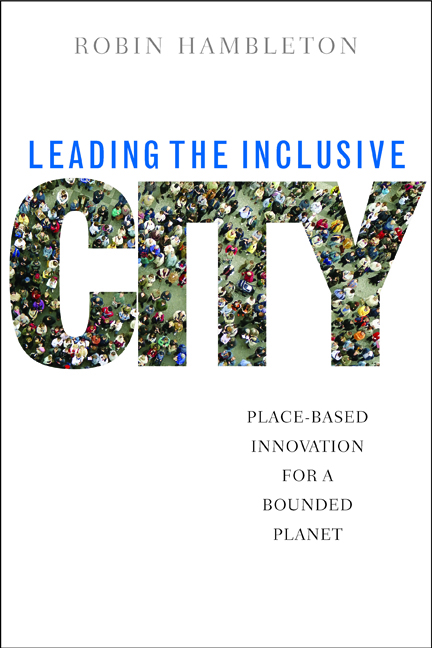Book contents
- Frontmatter
- Dedication
- Contents
- List of figures
- List of innovation stories
- About the author
- Preface
- A guide to the book
- Overview
- Part 1 Diagnosis: Understanding trends and challenges
- Part 2 Concepts: Place, leadership, innovation and democratic governance
- Part 3 Experiences: Place-based leadership in action
- Part 4 Lesson drawing: Insights and international learning
- Notes
- Appendix: International city networks and resources
- Acknowledgements
- References
- Index
Eight - Leading the eco-city
Published online by Cambridge University Press: 08 March 2022
- Frontmatter
- Dedication
- Contents
- List of figures
- List of innovation stories
- About the author
- Preface
- A guide to the book
- Overview
- Part 1 Diagnosis: Understanding trends and challenges
- Part 2 Concepts: Place, leadership, innovation and democratic governance
- Part 3 Experiences: Place-based leadership in action
- Part 4 Lesson drawing: Insights and international learning
- Notes
- Appendix: International city networks and resources
- Acknowledgements
- References
- Index
Summary
The world is too much with us; late and soon,
Getting and spending, we lay waste our powers:
Little we see in Nature that is ours;
We have given our hearts away, a sordid boone!
William Wordsworth, 1807, Poems in Two Volumes
Introduction
In this chapter I present three Innovation Stories, drawn from different continents, to illustrate how civic leaders have taken bold steps to make their cities both more environmentally sustainable and fairer places to live in. The cities I have selected are: Curitiba, Brazil; Guangzhou, China; and Freiburg, Germany. The socio-political context for the exercise of place-based leadership in these three countries is very different. But, as we shall see, civic leaders in each city have pursued imaginative policies and practices that have integrated efforts to advance environmental objectives with a strong commitment to social equity.
These cities are not alone. Indeed, several Innovation Stories presented elsewhere in this volume, increase understanding of what it means to strive to create an inclusive eco-city. For example, Malmö, Copenhagen and Portland all provide fine examples of eco-city leadership. What does being an eco-city mean? This chapter offers a contribution towards an answer to this question. Fortunately other writers have covered this territory in much more detail. They explain how an eco-city is likely to be one that: supports an economy that works with the environment not against it; questions the primacy of economic interests over other considerations; is alert to the environmental impact of decisions relating to urban infrastructure (particularly transport, energy, water, waste and buildings in general); and is committed to the principles of sustainable planning and urban development (Beatley 2011; Jackson 2009; Hall 2013; Newton 2014).
The ultimate aspiration of many eco-cities is, then, for residents and businesses to eliminate carbon waste and to produce all needed energy through renewable resources. In this chapter I am using the phrase eco-city to refer to cities that have a demonstrable commitment to reducing carbon emissions alongside a political promise to reduce social inequality in society.
Why have a chapter on leading the eco-city in a book about the inclusive city? The answer to this question is set out in Chapter 1.
- Type
- Chapter
- Information
- Leading the Inclusive CityPlace-Based Innovation for a Bounded Planet, pp. 207 - 236Publisher: Bristol University PressPrint publication year: 2014
- 1
- Cited by



